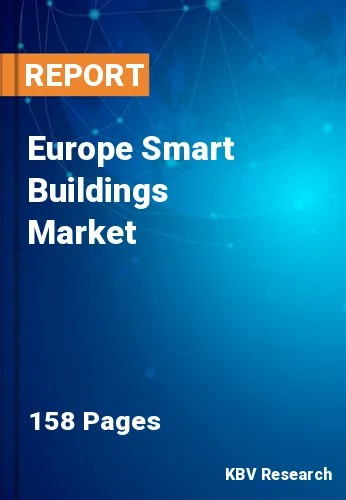The Europe Smart Buildings Market would witness market growth of 10.1% CAGR during the forecast period (2021-2027).
Advanced technologies including Building Management Systems (BMS), Internet - of - things devices, and AI are also used to design and construct the smart buildings, which help to regulate, monitor, and enhance building performance. The Smart technologies and sensors, among many other things, are combined into a digital building to allow control and monitoring of numerous processes within and across the structure. The Smart technology enables lighting, security, heating, and airflow to be monitored and controlled, and all these functions can be managed and linked over just a single network. Wireless communication & improved interaction between the user and system are allowed by advanced devices integrated with IoT devices and building automation solutions.
This permits property owners as well as workers to get real-time data and learn about many aspects of the location. The smart technology solution facilitates communication across different applications and data, helping in the transformation of buildings into dynamic, efficient, and high-performing environments. Smart building technology is actively applied to increase operational efficiency and improve tenant safety and experience in a variety of residential, governmental, and commercial buildings.
The European Union's rising focus on adopting efficient energy-saving solutions in domestic and commercial buildings is expected to propel the growth of the regional smart buildings market. By getting the WELL Architecture Standard accreditation, organizations in Europe are concentrating on employee well-being. As a result, the growing number of building equipped with smart office buildings is expected to expand the growth of the regional market.
Furthermore, there is increasing pressure in countries like the United Kingdom to encourage the adoption of energy-saving and cost-effective technologies, particularly in smart buildings and cities. IoT is expanding to satisfy ever more severe criteria and commercial constraints as a result of consistent technology advancements. Key data factors anticipate needs, take the necessary action, and govern the entire process from start to finish by connecting Connected technologies to a smart building. The introduction of NABERS ratings in the United Kingdom will raise the requirement for corporations to take a proactive solution for energy conservation and smart building design
The Germany market dominated the Europe Smart Buildings Market by Country in 2020, and would continue to be a dominant market till 2027; thereby, achieving a market value of $8,352.4 million by 2027. The UK market is poised to grow at a CAGR of 9.2% during (2021 - 2027). Additionally, The France market would display a CAGR of 11% during (2021 - 2027).
Based on Building Type, the market is segmented into Residential, Industrial, Commercial. Based on Component, the market is segmented into Solution and Services. Based on Solution, the market is segmented into Safety & Security Management, Building Infrastructure Management, Energy Management, Network Management, and Integrated Workplace Management System. Based on Safety & Security Management Type, the market is segmented into Access Control System, Video Surveillance System, and Fire & Life Safety System. Based on Building Infrastructure Management Type, the market is segmented into Parking Management System, Smart Water Management System, and Elevator & Escalator Management System. Based on Energy Management Type, the market is segmented into HVAC Control System, and Lighting Management System. Based on Services Type, the market is segmented into Implementation, Consulting, and Support & Maintenance. Based on countries, the market is segmented into Germany, UK, France, Russia, Spain, Italy, and Rest of Europe.
Free Valuable Insights: The Global Smart Buildings Market Size will Hit $131.5 Billion by 2027, at a CAGR of 10.6%
The market research report covers the analysis of key stake holders of the market. Key companies profiled in the report include Cisco Systems, Inc., IBM Corporation, Honeywell International, Inc., ABB Group, Siemens AG, Huawei Technologies Co., Ltd. (Huawei Investment & Holding Co., Ltd.), Intel Corporation, Hitachi, Ltd., Johnson Controls International PLC, and PTC, Inc.
By Buildings Type
By Component
By Country
Our team of dedicated experts can provide you with attractive expansion opportunities for your business.

